Top 10 Hosting
In US
Web hosting isn’t an option for business owners and digital creators; it’s a requirement. People turn to the internet when searching for products or services, so your business must have a reliable and easily accessible website for potential clients to find. Even a simple webpage that lists your business location, contact information, and hours of operation is invaluable, and gives your venture an air of legitimacy that it wouldn’t have if you forgo a website.

- Overall Web Host Price $1.67/month
- Ultra-fast UK server response times
- 30-Day Money-Back Guarantee
1

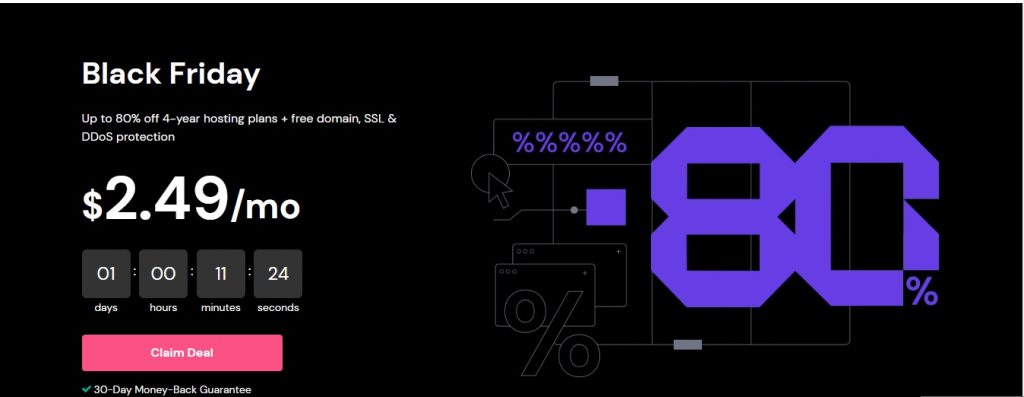
Fast Load Time – 307 ms
Fast page loading times are vital for any website user’s experience with a site.Have you ever tried to open a web page only to get stuck waiting for the site to load for what seems like ages? Moreover, you probably didn’t stick around for long. Hostinger boasts servers in the USA, Asia, and Europe (UK). Each is reportedly connected to a 1000 Mbps connection, which ensures that loading times are stable.Good Uptime 99.97%
Uptime is the most important thing to check out when considering a web host.Hostinger delivered an average of 99.97% uptime with an hour and a half of downtime over the six months. In total they had 26 outages, the biggest of them was in July when the average uptime was only 99.90%. Other than that, Hostinger’s uptime fluctuated between 99.96% and 100%.2


Good Uptime (99.98%)
Uptime is one of the most critical aspects when choosing a web host – after all, if your site is down, your users can’t access it. So, consistent uptime should be one of your top priorities when looking at hosting services. After reviewing many web hosts, our benchmark for “good” uptime is between 99.91% and 99.93%. So ideally, we don’t want to see anything less than that.Loading Speed (420 ms)
Research conducted by Google found: “As page load time goes from 1s to 3s the probability of bounce increases 32%.” This translates to your visitors being 32% more likely to leave your site. And it only gets worse with longer page load times. Furthermore, Google is more geared towards mobile-first indexing. This means that your site also needs to be optimized for mobile users, or otherwise, you’re losing traffic.Low Introductory Pricing ($2.95/mo)
Bluehost’s default pricing starts at $3.95/month, which is an introductory price from the regular $9.99/month rate.However, the good news is that we’ve been able to work out a deal with Bluehost for our readers that takes the starting price down even further to $2.95/month. For this price, you get pretty much everything you need for a single website. That includes 10 GB SSD storage, unmetered bandwidth, a free SSL certificate, and more. So you’d be getting a pretty good value for the price, plus their consistent uptime and page loading speeds.3

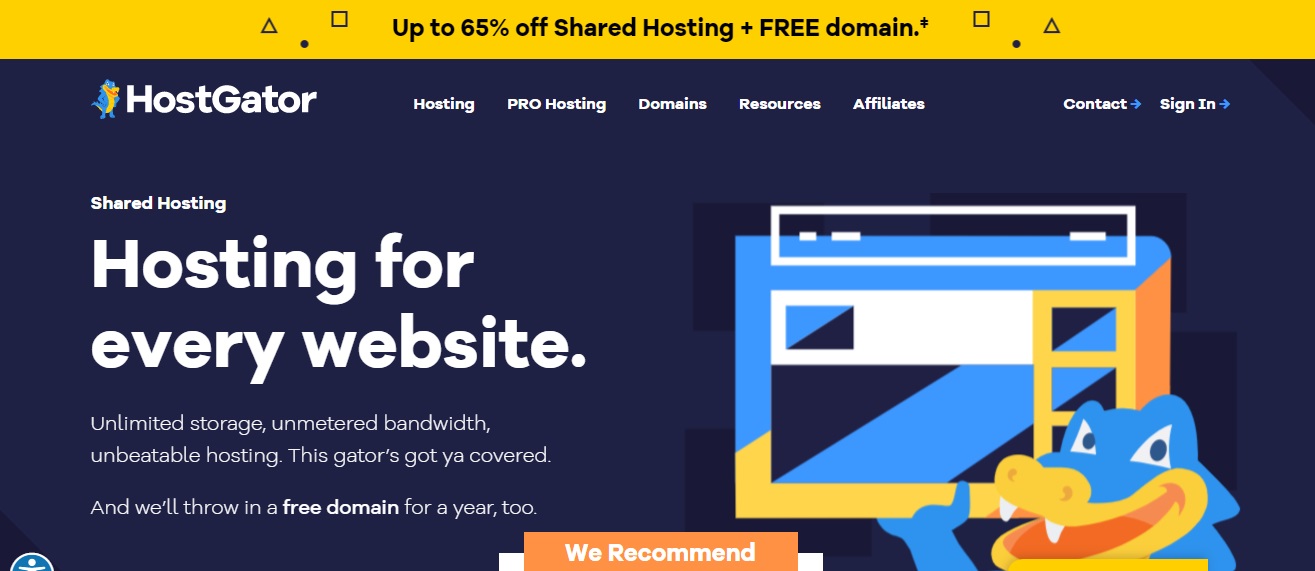
Page Load Speed
HostGator’s servers had no issues keeping our site up and live over the past half a year. However, what about their server speed? HostGator delivered an average page loading time of 688 ms. Moreover, HostGator has consistently improved its page loading times. Not a very long time ago, it took more than a second to load our site.Uptime (420 ms)
HostGator has posted an average of 99.85% uptime with over six hours of downtime over the last 6 months which is below industry-standard result. Another good thing is that they have an uptime guarantee which says that if they drop below 99.90%, you can receive one month of credit on your account.4

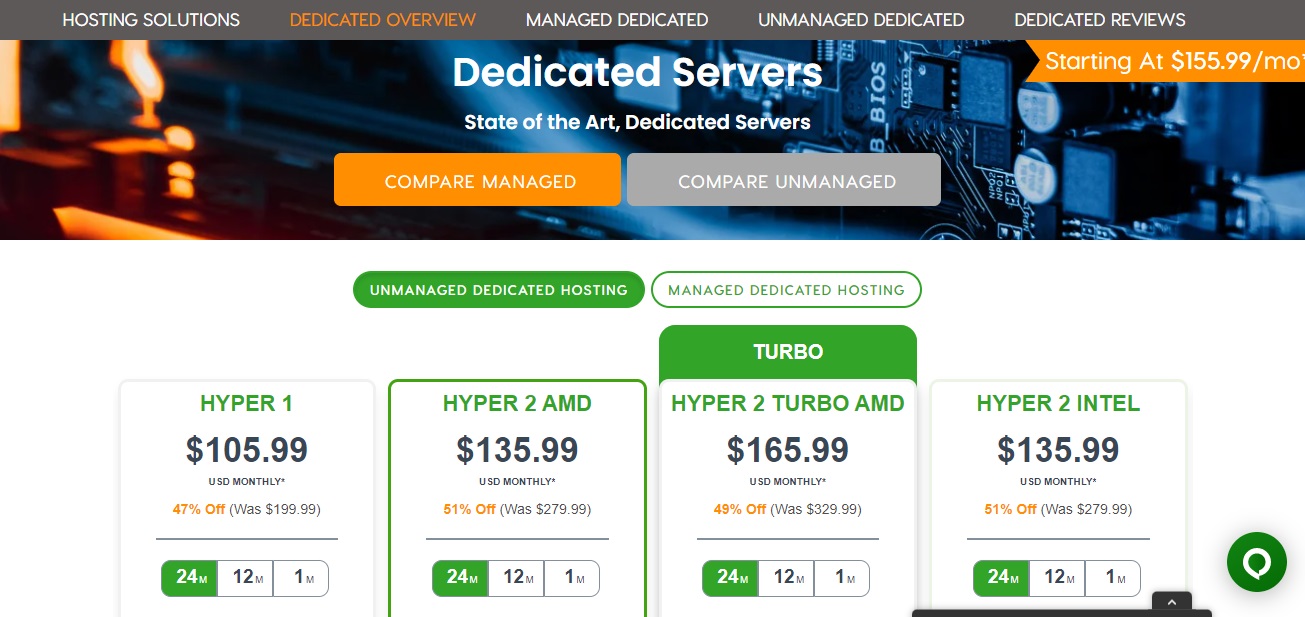
Performance
A2 Hosting servers that we’ve monitored since 2015 are optimized for WordPress websites and they use LiteSpeed cache. Thanks to that they are the fastest host we’ve seen with an average speed of 286 ms. Moreover, A2 Hosting is also reliable. Their average uptime over the past six months has been hovering around >99.99% with only 13 minutes of downtime.Reliable Uptime of 99.99%
On top of being lightning-fast, A2 Hosting is also reliable. They had some trouble a few years ago when their uptime struggled to reach the industry standard of 99.93%. However, they’ve turned the problems around and achieved an average of >99.99% uptime. The total downtime of their servers was only 13 minutes.5


With more than a thousand website hosting services out there, it’s pretty difficult to find a host that’s perfect for your needs. At first glance, GoDaddy is great, having low prices and some great features. Well, we want to help make the decision easier for you. So, we have signed up with GoDaddy to test their performance. We took a deep look at all their features and terms and wrote this definitive review to make it easier for you to know if GoDaddy meets your needs.
Great Page Load Time at 280 ms
This might come as a bit of a surprise: Our GoDaddy test site has shown a great average page loading time as low as 280 ms over the past 6 months. This is somewhat surprising because years ago you wouldn’t associate cheaper web hosts like GoDaddy with performance as great as this.
Basic Cheap Plan is Good Value
When we originally reviewed GoDaddy (in 2017), their cheapest shared hosting plan was too expensive, and the features were really limited. At least compared to the competition. Now, though, it seems they’ve done a 180-degree turn. Currently, the Economy plan pricing is only $2.99/month with a 12-month contract.
Good Uptime at 99.98%
GoDaddy delivers quite average uptime on their shared hosting plans. Their 6-month average uptime is 99.98%. An uptime rate of 99.98% means about an hour and a half of downtime per year, which is not too bad compared to some other hosts we’ve reviewed.
6


Average Speed (1730 ms)
Loading time is one of the most important factors when choosing a host. Not only does page speed affect visitor bounce rate but slow loading time can also affect your overall SEO (not to mention Google rank). This, however, calculates lost profit. So needless to say, the faster your website loads the better. Unfortunately, DreamHost’s 1730 ms average loading time over the past 6 months hasn’t been good. It puts them in the lower half of the hosts we’ve tested.Average Uptime (99.77%)
DreamHost’s 6-month average uptime is also nothing to brag about – 99.77% with more than 10 hours of downtime. That’s bad and could potentially mean lost website visitor traffic and profit for you. However, the good news is that DreamHost has an uptime guarantee. Like other hosts, if your monthly average falls beneath that threshold, you’ll get a credit for the cost of the service. DreamHost, though, guarantees 100% uptime in their Terms of Service. Keep in mind that scheduled maintenance or user errors aren’t covered in this guarantee.7


SiteGround is a popular shared hosting provider that is trusted by more than 2.8 million domains. Besides shared hosting, they also offer WordPress hosting, cloud hosting, and even dedicated servers. We paid for a shared hosting account, set up a live test site, and have been closely tracking their performance with a third-party tool to provide this unbiased, transparent review.
Good Performance
SiteGround’s uptime performance has been nearly perfect over the last six months. Their 99.99% average puts them among the most reliable hosts we’ve reviewed. Strong uptime like this keeps website visitors happy. But more importantly, it means your site is almost guaranteed to be working around the clock so you won’t miss out when your customers want to make a purchase, either.
Average Load Time (356 ms)
Site speed is easily the second most critical factor when choosing a host. For starters, research by Google shows that 53% of people will leave your site if your page doesn’t load within three seconds. Furthermore, you can’t do much to fix a slow host. You might be able to compress images to lighten their weight. You might be able to load them through a CDN to take some pressure off your server.
Good Customer Support Experience
SiteGround provides a knowledge base for customers to find their own quick answers. Otherwise, you can call in over the phone or use the 24/7 live chat. For this latest test, we opted for the live chat option and we connected with their customer rep in less than a minute.
Unlike some other hosts, there was no noticeable delay in answers. So it seemed like he knew what he was talking about and didn’t have to look up answers each time we sent over a new question.
8

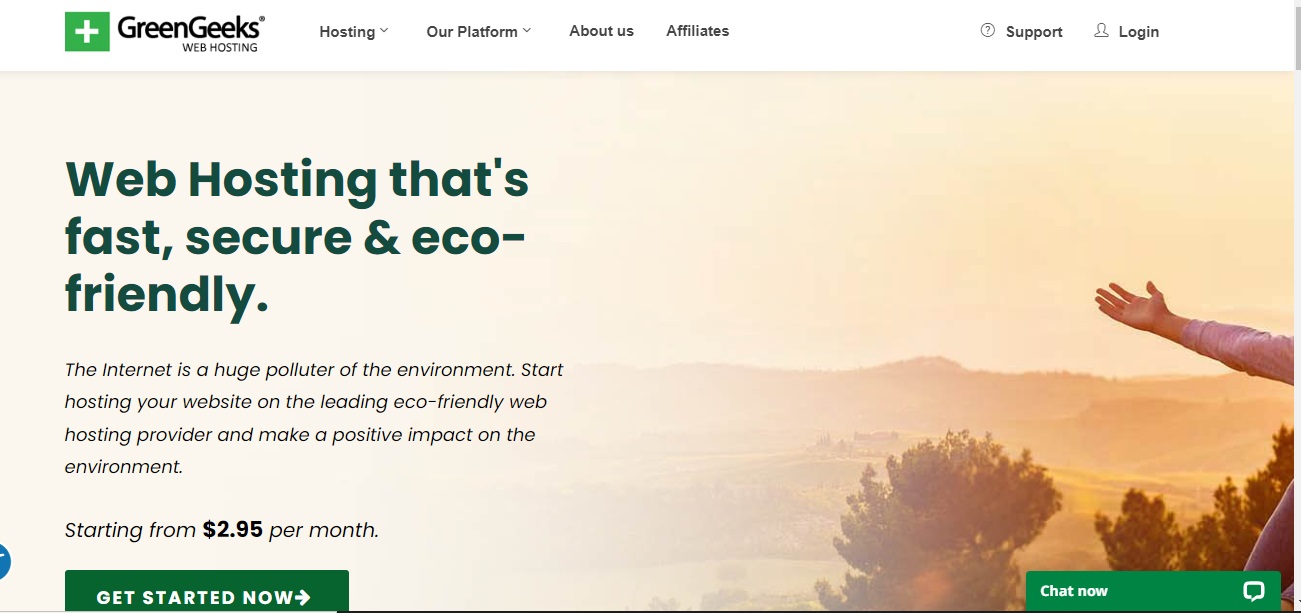
GreenGeeks was founded in 2008 by Trey Gardner, and they’ve now shot up to hosting over 600,000 websites (with data centers in the U.S., Canada, and the Netherlands). Trey’s background is important, as he’s worked with eight different web hosting companies, including iPowerweb, iPage, StartLogic, Dot5Hosting, Globat, Lunarpages, HostPapa, and now GreenGeeks.
Reliable Uptime Performance
GreenGeeks didn’t disappoint in this area. They delivered an average uptime of 99.93% during the 6-month testing period. Throughout the whole half a year their uptime was between 99.96% and 100%, except in August when the uptime was only 99.66%.
Good Page Loading Time (478 ms)
Another important factor to look for when choosing a host is their server speed. Why? There’s a 32% probability of a site’s bounce rate increasing if it takes one to three seconds to load a website. In short, the longer your page takes to load, the more likely visitors will leave. And that’s just one of the ways how speed can affect your website. Once again, GreenGeeks didn’t let us down. Their speed is better than the industry average, clocking in at around 478 ms.
Good Support with Quick Answers
Customer support is another “big element” of the review. We tested out GreenGeeks’ live chat and were connected to a customer support agent within a minute, who then answered questions quickly and concisely.
9

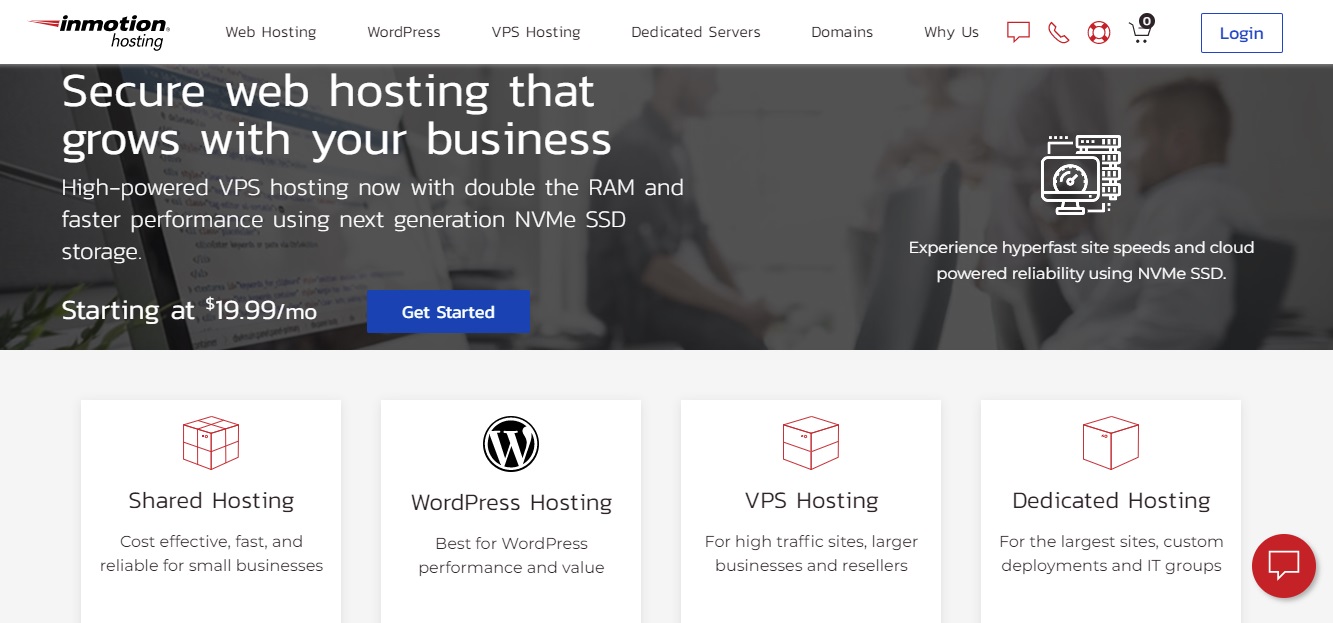
Chances are that you’re familiar with InMotion Hosting. Maybe you haven’t used them, but you’ve heard of them. Or seen them around. A vague recollection of their name or ads somewhere some time. That’s because they’re big. And reliable. As one of the veteran and more established names in the hosting industry, they also boast grandiose claims of being number one in transfers, support, and industry guarantee.
Good Speed 311 ms
Fast loading times aren’t just great for user experience. Speed is also factored into Google’s algorithm for dictating where in the rankings you’ll show up (you know – the whole SEO thing). How fast your page loads has one of the biggest impacts on your bottom line, forcing half your traffic to bounce if it doesn’t load within two seconds.
Great Average Uptime of 99.97%
InMotion Hosting’s average uptime clocked in at 99.97% with an hour and 20 minutes of downtime based on our careful tracking and monitoring over the last 6 months.
This is a nearly perfect result and if it wasn’t for May’s poor uptime, InMotion’s performance would have fluctuated between 99.97% and 100%.
Customer Support
InMotion Hosting has a variety of support options to choose from: live chat, phone, email, and even Skype. We tested out their live chat option. We asked a few simple questions about their shared hosting plans and the customer rep connected within a few minutes. The replies were a bit delayed and concise, but still good enough to keep our attention and not go looking elsewhere for answers.
10


IONOS (previously known as 1&1) is a web hosting service that includes several website tools. They cover most of the hosting options available, such as shared hosting, VPS hosting, WordPress hosting, cloud hosting, and more.We tested a number of factors including customer service, overall usability, service uptime, and more to present you with the most complete review possible.
Strong Uptime – 99.97%
One of the most important metrics that we measure when it comes to hosting providers is uptime. You’re paying to have your website online. If uptime is lacking and your site is routinely going down, then your hosting service has failed you in its most crucial area.
Loading Speed 713 ms
A slow site isn’t just annoying: when a page takes too long to load, many of your potential visitors will already look elsewhere. Why is that? Site performance is a big deal when Google examines your site. Your all-important SEO score, which determines your placement on the world’s most popular search engine, relies heavily on it.
Improved User Interface
IONOS doesn’t use the classical cPanel, instead, they have developed their own custom backend. For those who are used to the cPanel, it may be confusing and take some time to get used to in the beginning, but overall, it’s rather easy to use.
FAQ
1.What is Your Website’s Needs and Budget?
2. What is the Renewal Fee?
3. What are the Security Features?
- Shared Hosting
- Virtual Private Servers (VPS) Hosting
- Dedicated Hosting
- Cloud Hosting
Security turns into the leading edge of every company. While this holds for organizations and conglomerates, that is additionally important for smaller businesses. If you need your enterprise to flourish, your clients have to have the warranty that they’re safe; they'll consider you

